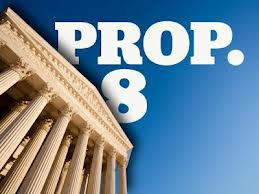There have been no great surprises in the first few weeks over Proposition 8, which is California’s beleaguered same-sex marriage ban. None of the justices of the Supreme Court share an epiphany on the topic. They are all precisely who we thought they were, who they’ve always been. This is the most conservative in 75 years–the most conservative federal court in that nation–and it shows, both in the ideology of the justices’ questions and in the reluctance they express to issue a broad ruling.
Nor does the tone of the argument itself seem likely to generate a historic ruling. As the conservative justices point out, the Obama Administration seems to want it both ways: to preclude California from discriminating against gay couples, but to continue to allow states to do so. This makes sense politically for, after all, half the country still opposes same-sex marriage–but legally, it’s inconsistent.
Justice Scalia and Samuel Alito [IDENTIFY THESE PEOPLE] are still outwardly hostile to any recognition of same-sex rights. And the Court’s four liberal members all seem openly supportive of gay marriage rights–or hostile to the idea that Prop 8 can survive. In this sense, the moral argument tells us little what we didn’t already know: The Court is sharply divided on the topic.
The fight over Proposition 8 will likely be decided by two of the justices: Chief Justice John Roberts and Justice Anthony Kennedy. Roberts, the crafty politician who isn’t inclined to support gay rights, is searching for a path to end the case without necessarily ending the cause. Kennedy, who will definitely be in the majority, seems unhappy with all the options handed to him.
The Court is usually eager to resolve cases and controversies in the narrowest grounds possible, and if the justices are inclined to do, there are several options available to them in this case. The argument had barely begun, for example, when the justices began peppering Charles Cooper, the attorney defending Proposition 8, with questions about whether he even had the legal right to stand in the court.
The Justices also raised the standing issue with Ted Olson, who represents couples who challenge Prop 8, and Donald B. Verrili, the Solicitor general of the United States. If the justices dismiss the case on the technical ground, Prop 8 will stand to be void–and still the subject to future litigation.
The consensus from a nightly news watcher seems that the Court is itching for a way to void a sweeping ruling on same-sex marriages. Such a ruling would be terribly disappointing to same-sex advocates who vision a forward thinking American society. But in the seminal case, you go to court with justices you have. And the justices American has right now seem ready to wait a while longer to recognize marriage equality.
[THIS IS A LOT OF RECITATION OF WHERE DIFFERENT PEOPLE STAND WITH THEIR OPINION ON GAY MARRIAGE. INCLUDE MORE OF YOUR OWN OPINION]








